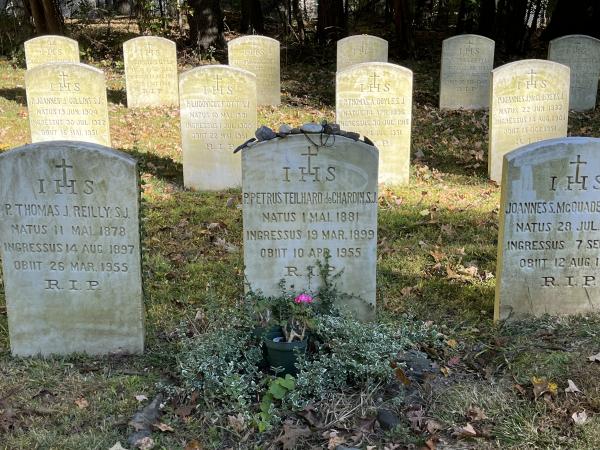Earlier this October I spent a day at the CIA. Not the one that tracks down spies. Rather the one along the Hudson River in upstate New York where they train chefs – i.e. the Culinary Institute of America. I was not there for the food. (Though I did try a piece of apple pie and it was pretty darn good.) I was there to visit the grave of Pierre Teilhard de Chardin, SJ.*
If you are wondering why he is buried at a cooking school, that would be a good question. Turns out that the campus that is now the Culinary Institute of America was once upon a time the East Coast provincialate for the Jesuits and Teilhard spent his final years with the East Coast Jesuits in NYC at St. Ignatius Church on Park Ave. Hence he is buried at their old provincialate graveyard.
The graveyard is gated and you have to ask CIA security for a key to enter. But once you do, his grave is easy to find because it always has flowers and pebbles and other small mementos people leave. In the time I was there, five other people also stopped by to visit. He is well loved.
I can only guess why the others were there, but for me it was important to visit because Teilhard reminds me of the big picture. I mean the REALLY BIG PICTURE. The evolutionary picture that stretches billions of years in which each of us plays a tiny role that matters but is a truly tiny. We are part of a collective so much bigger than ourselves which is part of a cosmic plan beyond what we can even grasp a particular moment in time (and maybe in any moment of time). Teilhard reminds me are called to do what we can do and then—like Pope St. John XXIII—say, “Okay, God, I’m going to bed now. It’s in your hands.”
As we approach our U.S. presidential election 2024, I find myself sitting with big picture Teilhard wrote about more and more. In September and October, I visited ten states in addition to the one I call home. Some more than once. And I made one trip abroad. (Okay going to Canada doesn’t really feel like going “abroad.” Still, it was a good little hike to get there and back and passports were involved.) In most of those places, I was talking about the importance of truth, the healthy use of power, and the need to remain in conversation with one another when we disagree—even on such critical issues as what is true and what represents good use of power.
At some point in there I became more and more aware of how tiny my efforts were in the big scheme of things, and that this is neither a bad nor good thing, but that at this point really probably the best thing I can do is to simply pray. I wrote that litany of saints which I shared earlier this month. And then I shared a shorter form the last time I posted, because it turns out sometimes I probably use more words than are needed. Of late, I am finding myself getting briefer still. Simply thinking of members of the vast communion of saints throughout the day and asking their intercession for our country—for a peaceful election and transfer of power in which the very best slate of candidates who would do the most good for the world be the ones who are elected.
At this point there are a lot of random ancestors in faith who’ve probably never heard me speak aloud their name before being called upon out of the blue. Rita of Cascia. Rose of Lima. Luigi Guanella who I only just learned about in Give Us This Day. Gustavo Gutierrez who entered his heavenly reward less than a week ago. Bartolomea Capitanio who I take for granted will give my request special attention since I suspect I am the only person in history to have taken her as my confirmation saint. (Even the bishop had never heard of her before.) No one is safe from being called upon in my litany anymore, and I am grateful to hear from you about the saints that you are calling upon—John of the Cross, Teresa of Avila, the Ecological Martyrs of the Amazon.
The fruit of this—as I speak about in my preaching for the Solemnity of All Saints on November 1—is a deepening of the peace I felt sitting at Teilhard’s grave along the Hudson. We are part of a great communion that connects us and our times to those of other times who have faced similar social ills and political crises. These, as the book of Revelation relays in the first reading of the feast, "are the ones who have survived the time of great distress” and they help us hold on to the truth that, "Salvation comes from our God, who is seated on the throne, and from the Lamb." Not from any one of our efforts, nor from any political system.
Soon this particular moment in time shall pass, as they all do. Indeed, in the great scheme of things, it will not be long before future generations will be calling on us in the middle of the night to intercede for them. We are all part of a grand cosmic project so much larger than ourselves, and what we can’t do alone, we can do together… or at least support each other through.
*There are many good books on Teilhard, but to explore his influence on the Catechesis of the Good Shepherd movement, see my book A Year with Sofia Cavalletti (LTP)
